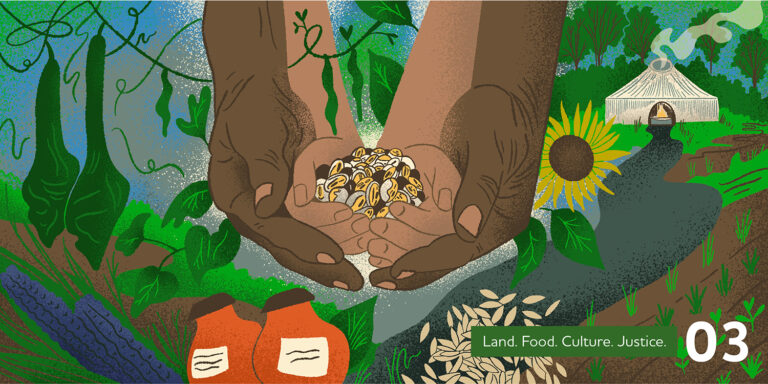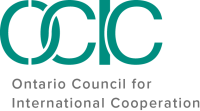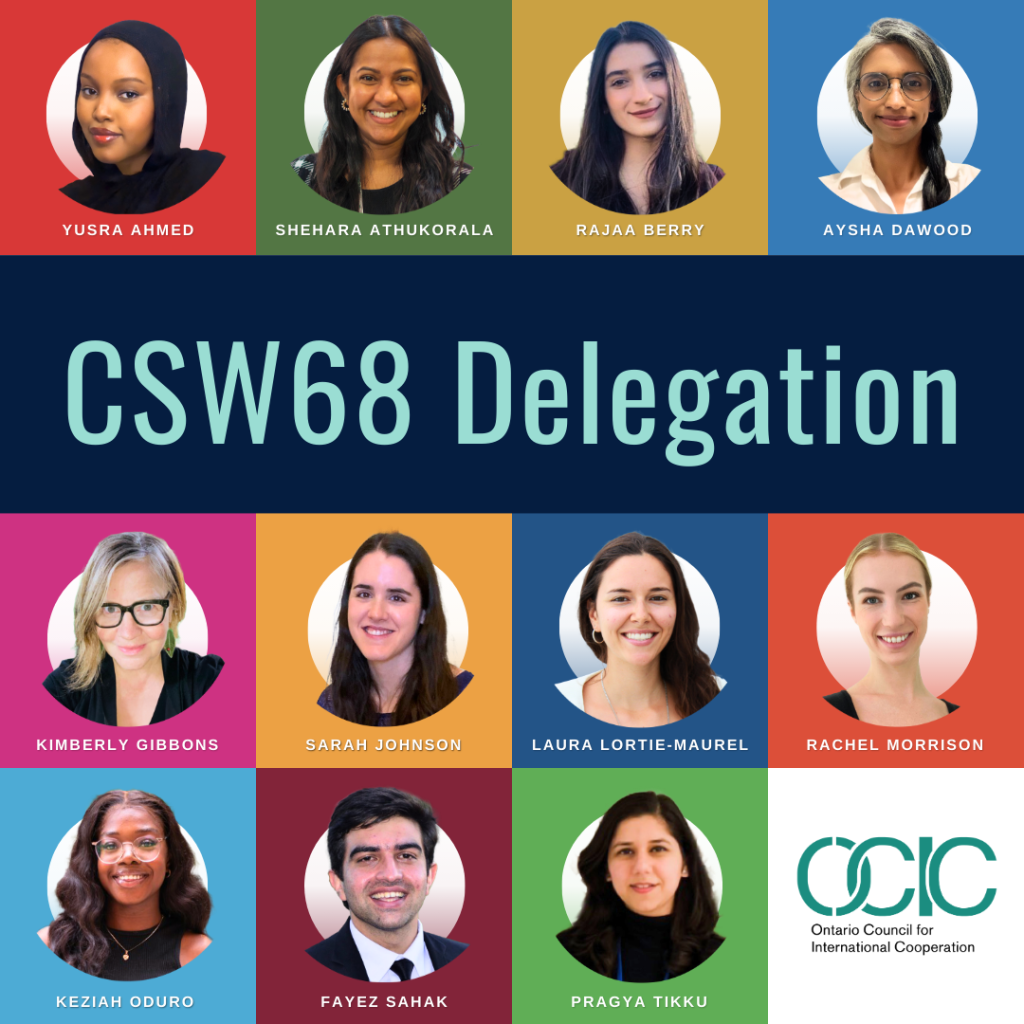TAPESTrY 2030 EPISODE 3: Land. Food. Culture. Justice.
TAPESTRY 2030 Season 2
EPISODE 3: Land. Food. Culture. Justice.

TAPESTRY 2030 TRANSCRIPT – EPISODE 3
Episode 3 Transcript
Shegoli…I’m Celeste Smith and I’m the host of Cultural Seeds…
I am an Urban Indigenous Farmer, Educator and founder of Cultural Seeds and Ga Gitigemi Gamik…We Will Plant Lodge.
(transition to storytelling)
My Grandmother Ethelyn was born on the Six Nations reserve in So-Called Canada.
She was an orphan, so she was raised by her grandparents in a tiny tar paper shack.
I’m not kidding – it was so cold in the winter, my gr gr grandfather had to sleep beside the wood stove to keep them from freezing to death.
She told me stories of the “white people” rations they received every month which kept them fat and lazy and dependent on the government because even though he was an accomplished farmer, her grandpa was not allowed to farm and compete with the settlers.
Perhaps this is what eventually brought me to this work.
Or perhaps it was because my grandmother was too scared to learn traditional Indian medicine because of her residential school abuse which taught her everything she knew was dirty and bad. (her words)
Whatever it was, I am here now and I have made it my life’s mission to fight against the racist colonial injustices my family and so many others endured through grassroots activism and local solutions…
I’m working hard at building an agricultural rematriation project rooted in ancestral knowledge…to bring back our food systems and food justice. A place where women and gender diverse folks can come to relearn ancestral traditional Knowledge and establish the connection between our land and our food and our food and ourselves.
I have always been acutely aware of my loss of cultural heritage and how the literal and cultural genocide of my people has affected both me and the world around me.
I’ve traveled to universities, lodges, and kitchen tables and I’ve heard the same thing: we need to go back to our roots. Literally.
This series will focus on some of the most pressing issues we are facing as Indigenous people and how we are defending and rebuilding our culture from the roots up.
I will be sharing my thoughts on the subjects…but I will also be talking to some amazing folks, from seed keepers to land defenders to lawyers and I will be asking them HOW…how do we do this? After cultural genocide…how do we take back what was stolen? What was hidden? What was declared GONE?
We may not know the answer yet but I do know one thing: We will find it together. I hope you will join me on this journey of RECLAMATION> Indigenous Style…
Nika Ho
It is the right time.
(Break…music or drumming or rattle)
LAND
Buzz Buzz Buzz
I’m often asked by settler folks “what does Land mean to Indigenous People”?
WHY DOES IT MEAN SO MUCH TO US? WHY ARE WE WILLING TO RISK JAIL OR EVEN DEATH TO DEFEND IT?
This is the part in the podcast where I remind you that I cannot and will not speak for all Indigenous Folks and I can only speak for myself.
So I can say for me…
The Land holds the memory that everything is connected.
The history of our relations both good and bad…whether it’s the escarpment scars created by a glacier 1 mil yrs ago or a blown mountaintop in Tennessee where coal is extracted…
These are the indelible marks left by an interconnected web of systems that don’t exist for each other but nonetheless depend on each other, rely on each other and their futures are intertwined
I speak about connection and inherent responsibility and family. I talk about rocks as grandfathers and mountains as relatives. I ask them what they would ask a BOULDER about what it has seen? And then I sometimes tell them that I remember when I didn’t know how to talk to rocks.
When I was younger than I am now, in spirit and body. I was visiting a Cree fly-in community in the far north as a part of a filmmaking journey. The community was just getting back on its feet after years of substance abuse and self-harm and we were helping the youth by documenting their stories. We also bought drums and cultural items from our communities to share. The church had done its job very thoroughly here…and most of the folks were Christian.
But one man had the courage to hold a sweat lodge for us southerners and used our visit as a chance to teach the youth. It was my first time setting up a lodge from scratch…and I was
The OJI CREE teacher told me to look for “the right rocks”. He said they were round and of a certain size. He also said they would call out to me.
I nodded, and quite terrified, I walked out into the quarry to find my share of grandfathers. I had no idea what I was doing. I was wandering around a pit filled with rocks and trying to listen to them one by one.
How would I know if it was a grandfather?
What if it was a grandmother? Cousin? Auntie?
What did they sound like?
I am not Cree!
I don’t speak Cree!
Do they know I’m not Cree???
Eventually, I found my share of rocks, and tossed them in the truck with the others. He appraised my finds with a smile and he reminded us young folks that the rocks were the oldest living things. He told us that if we learned to listen, we could ask them questions and they would answer.
I remember thinking that I wanted to hear the rocks speak to me more than anything in the world.
I can hear them now. After years of study and prayer and decolonization of my western trained mind.
When they ask how, breathless as if some honeyed wisdom is about to drop from my lips like a mystical prayer…I say one word.
Relationality.
I tell them I relearned my relationship to rocks.
This puzzles them.
Because the basis of Western Society is about disconnect, and they have been taught alienation vs connection. And there is no relationship to anything without connection.
On every level, western knowledge systems give us narratives of difference and exclusion.
How we are not the same.
And not only are we not the same, but the differences between us are the most important things to value. our dIfference, not our sameness, is what is important. Our INDIVIDUALITY.
We are taught that money is the thing that binds relationality in our society. Commodity. BUT money has no responsibility to us. It is a means to an end.
Even gifts are commodities. Trade. Gifts are given and must then be received. There is no such thing as a true gift in western society, a gift freely given.
So, when we talk about rocks having a spirit…or as alive and literally our kin (our grandfather) that level of relationality is alien to settlers.
It is so strange and new.
No wonder we don’t understand each other.
Buzz buzz buzz (Break) Maybe a clip?
For most Indigenous folks I know, land and food are connected because our families still get our food from the land in many ways. Whether it’s fish or berries, harvesting food at certain times of the year is something that we have always done, and still do.
Even the most urbanized Indigenous folks will somehow get their hands on some wild blueberries or some whitefish from an auntie or uncle, a few times a year. (if they are lucky).
We’ve been taught that the land provides everything we need to sustain ourselves, and that organic, local and low-impact food is good for our bodies – and it is right outside our back door.
The separation of food and body is not as complete as it is with Settlers.
But even with this abundance, food insecurity is a huge problem in Indigenous communities. But this is due to colonial oppression and not our traditional food systems…reclaiming those food ways are crucial to our health.
We see this is study after study, declaring Indigenous health to be some of the worst in the world. Our diabetes rates are so high in some communities that they have declared them an epidemic. This new way of eating and living is NOT good for us. And looking at the health of the nation as a whole, quite frankly it’s not good for anyone.
I took a bioengineering course in college and the first thing I learned was the first bioengineered product humans produced was beer!
RIGHT. Um sir…
Indigenous folks created corn from a blade of grass.
We created the POTATO.
You know, I really can’t express enough how much paternalism irks me.
White supremacy has always denigrated Indigenous knowledge systems and our science is no exception…when I teach, I always surprise folks who cant believe we even have science, let alone cosmology,
But lets remember, we had medicine societies…before our colonizers.
It wasn’t until 1850’s that there was a recognized medical system in Europe,
COME ON.
This is the same decade Europeans declared sex caused women to go insane.
(Break) MUSIC…drums or rattles or land back??? lol
Land back is not just about protesting the colonial model of “Land Ownership” but a call to action to our own communities to get back to the land and our original cultural teachings.
One of the things I tried to teach settlers when they were protesting haudenosaunee hunting access to Short Hills Provincial Park was that our people needed healing and the best way to do this was get them out on the land as families.
I was taught that it was the Uncles responsibility to teach your kids by taking them out deer hunting.
This intergenerational bonding is so important to keep families strong and as our land disappears so do our family ties. This is what “Cultural Genocide” means in reality.
The braiding together of sweetgrass demonstrates this and reminds us to keep our families tightly woven together.
In our communities, our children are treated with respect and also with agency. We know that they learn through experiences so we let them control their own behavior through these experiences.
Mistakes will be made and lessons learned.
This way of child rearing does not produce over controlled kids with no sense of purpose or responsibility. Our kids learn by observing and experiencing life’s natural balance.
This is why access to land is so important to our way of life.
Many of our teachings take place while we are gathering food or in the gardens and observing the world around us.
Now agency also means choice, so if one does not take part, there are natural consequences.
If you conceptualize human nature through a western lens you either are a naive child or a vile beast. And ultimately you need to be CONTROLLED by something, whether it be a concept or another human, it comes from outside one’s self…because human beings are not thought of as having agency. And This is a major part of how we see the world. Agency is within everything in creation…from a one-year-old child…to the trees and the water.
A tree has its own agency, and also inherent responsibility…it talks to its relatives in the forest and helps its community grow and prosper by making sure each nearby tree has enough to drink and eat. It sends warnings to others when pests are near and it times out when it sends out fruit and nuts for the benefit of all.
This mutually beneficial dance of give and take is repeated everywhere in creation
The trees help each other because it is better to live in a strong unified group….Just as a thousand years ago, we saw our individual tribes as stronger as a united Haudenosaunee Confederacy.
5 arrows bound together, are stronger than one single arrow, and cannot be broken.
On a larger scale, however, our values can be seen in a new light.
There is a new urgency to our reclamation efforts: the climate crisis.
I have been told by many elders that the environmental disaster we are now witnessing is because of the natural consequences of not living in relationship with the land…
we take too much and we don’t give enough back.
This is a concept we learn as children.
There is a lack of JUSTICE which is being reflected in the crisis we are now experiencing. The good news is, we know how to fix it.
START GIVING BACK.
(Break) Music or sound effects
Wrap Up
Segmented societies make segmented people. In a world built to separate each other we become separated from ourselves. People that are not whole.
That search for that wholeness is an emptiness that I see over and over again in folks that are disconnected from the world, Indigenous and Non Indigenous alike.
That is why many Elders and Knowledge Holders I know get romanticized, because the worldview being presented is not seen as possible for folks raised in a Western Centric Knowledge system. Mostly because of the lack of respect or even acknowledgement for other so-called “Ways of Knowing” which is why we are constantly reminding folks about the Western “superiority” complex.
There is a quote from the marxist scholar Frederic Jameson “It is easier to imagine the end of the world than the end of capitalism.” When bound to thoughts of only what is possible, we will not fight to make what is now impossible possible. In short, without an ability to imagine an alternative to our society’s skewed system of relationality, we are doomed to relieve and replicate this system not just in our institutions but within our very minds. The last place the colonizer leaves is the inside of our heads.
MUSIC
Outro
Yaw’Ko!
You have been listening to CULTURAL SEEDS…A PODCAST ABOUT REMATRIATING INDIGENOUS RELATIONSHIPS WITH LAND, FOOD, CULTURE AND JUSTICE
with YOUR HOST, Celeste Smith.
Big Thanks to our very talented team: head writer Alex Smith and lead editor Hunter Smith. AND More thanks to our musical inspiration SacRED…you can find her stuff on Spotify and Itunes…and get involved through her digital community on sacredmatriarch.com
We hope you will follow us on your socials; look for cultural seeds on facebook and instagram and listen FOR future episodes coming soon on our substack. We will also host our episodes and other good stuff on your website: CULTURALSEEDS>COM
This very episode was made possible by the generous support of the Ontario Council for International Cooperation… So many Yawgos to the staff for their encouragement to help make this series possible.
MUSIC – Rattles or drum
Episode Resources:
Just a reminder about supporting Indigenous economies…Most of the books supporting the views in this podcast, have been sourced at GOODMINDS.COM, or Raven reads.org
2 wonderful Indigenous owned bookstores.
Please remember to support ECONOMIC RECONCILIATION and buy from Indigenous owned businesses and learn from Indigenous authors!
This episode I suggest reading “How it is” by V.A Cordova, who is a truly undervalued Dr of Indigenous philosophy …and “God is Red” by Vine Deloria Jr. …2 of my very favorite books.
If you would like more reading suggestions, Goodminds has put together some excellent reading lists to get you started.
More personal recommendations next episode!
Outro MUSIC – sacRED






